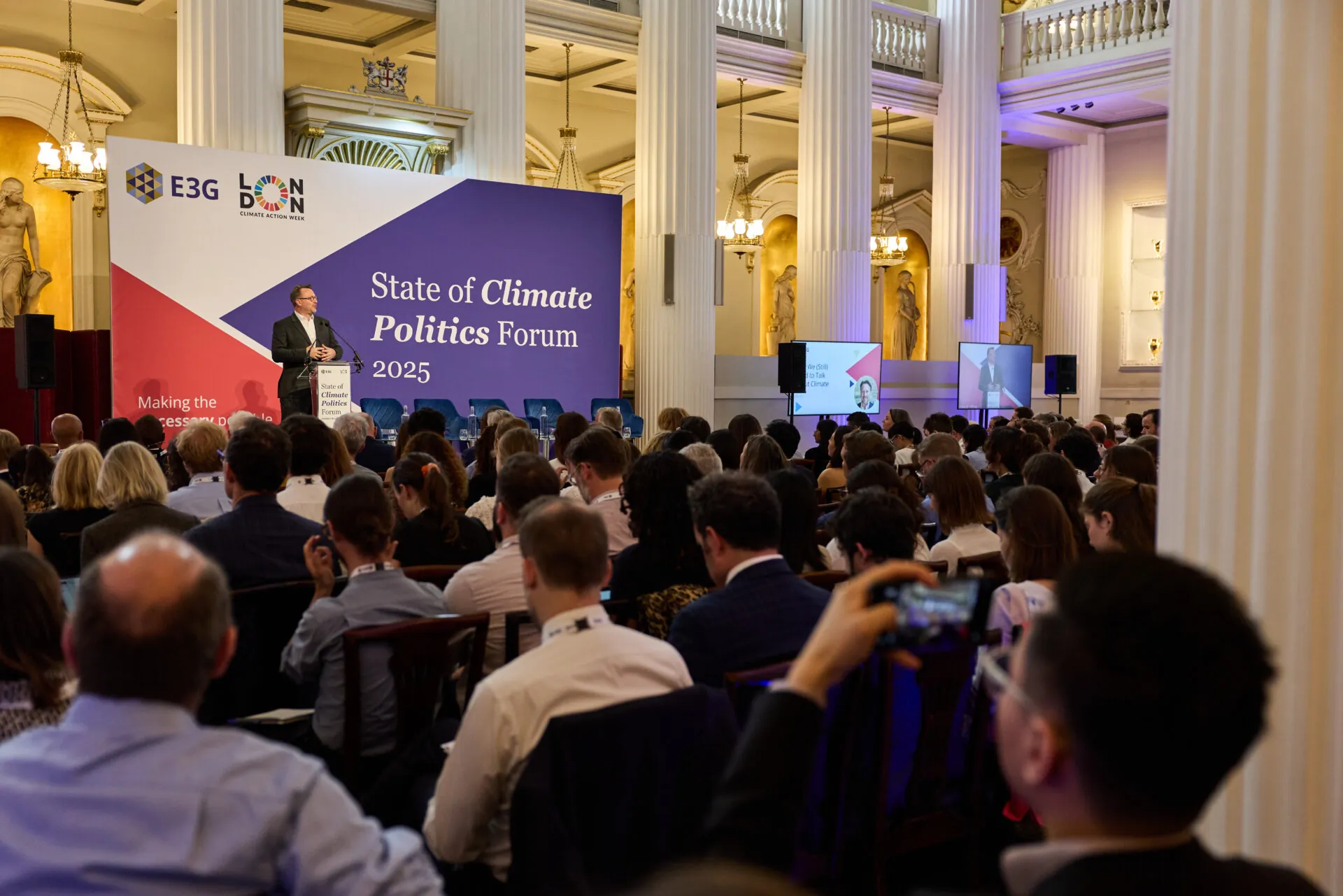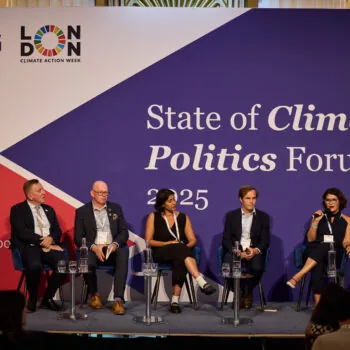The second annual State of Climate Politics Forum took place last month as part of London Climate Action Week 2025, convening leading voices in politics, foreign policy, climate diplomacy, and civil society. Hosted by E3G, the forum brought together political leaders, policymakers, and climate experts from around the world for a day of high-level dialogue and strategic insight.
Held at the midpoint of this pivotal decade for climate action, the forum explored how shifting geopolitics, rising populism, and accelerating clean economy transitions are shaping the climate agenda in 2025. Through a series of keynotes, panels and facilitated conversations, participants examined the evolving political landscape and the pathways to crafting resilient, science-aligned climate politics.
From climate leadership in a critical election year, to the role of trade and security in driving action, the discussions offered fresh thinking and a timely stocktake of global momentum.
Below you can watch recordings of each session and revisit the insights shared across the day.
Why we (still) need to talk about climate – Opening session
E3G CEO Nick Mabey opened the forum by setting the stakes: climate action is increasingly challenged by political polarisation, economic uncertainty, and geopolitical tension. He stressed the need to keep climate at the centre of political and economic agendas, and called for collective action to bridge divides and deliver solutions that work for the majority.
The Politics of opportunity: Finding cooperation & economic opportunity
This panel explored how to sustain climate progress amid shifting geopolitical realities, highlighting momentum in renewable energy, green finance, and coalition-building. Speakers shared perspectives from Africa, India, and the global clean energy sector on how to align development priorities with climate goals.
Climate science & the politics of resilience – Fireside
This fireside chat explored how science and political leadership can work together to build resilience in an increasingly turbulent world.
The discussion highlighted the growing climate leadership of regions like Europe and China, while emphasising that scientific data alone isn’t enough, true resilience must be rooted in local realities and shaped through meaningful engagement with communities on the frontlines of climate risk.
The public vs the backlash: Untangling the politics of net zero – Panel with audience interaction
This panel examined the growing gap between strong public support for climate action and the political backlash driven by some elites and populist movements. Starting with fresh UK polling data, the conversation explored trends globally, including disinformation campaigns, anti-net zero narratives, and strategies to sustain public backing. Speakers emphasised the need to ground climate messaging in public priorities and develop new ways to navigate backlash in an evolving political landscape.
The 1.3 Trillion dollar question – Accelerating finance to EMDE – Panel
Accelerating the global clean energy transition, especially in Emerging Markets and Developing Economies (EMDE), will require unprecedented investment and innovative partnerships. This session explored how countries and alliances are working to unlock finance, with a focus on delivering the $1.3 trillion target by 2035 outlined in Paragraph 28 of the Global Stocktake. Panellists shared concrete proposals for accelerating funding and reflected on the potential of the Baku to Belem Roadmap to drive progress.
Energy – Powering up global energy goals – Panel
The global shift from fossil fuels to renewables is accelerating and business leaders are firmly behind it. A recent global poll shows 97% of executives support moving away from fossil fuels, with strong backing for a renewables-based electricity system by 2035.
With COP30 approaching, this panel explored how to turn that support into real-world delivery of the Global Stocktake energy package, and how countries leading the transition can unlock growth, energy security, and investor confidence, even in a volatile geopolitical landscape.
The new geopolitics of climate action: Between a rock & a hard place – Panel
As climate change deepens and global turbulence grows, the intersection of climate and geopolitics is becoming more complex. This panel explored how Europe can respond, by showing leadership, strengthening multilateral cooperation, and helping shape a global energy transition others are ready to join. In 2025, Europe’s influence will be defined not just by climate ambition, but by its ability to drive shared global progress.
Road to COP30 and beyond – Multilateral cooperation in a multipolar world – Keynote
Ana Toni, CEO of COP30 Brazil, delivered a powerful reflection on the role of multilateralism in driving climate action. She emphasised that COP is more than a two-week event—it’s part of a continuous global process, reflected in discussions like those at the State of Climate Politics Forum.
Looking ahead to COP30, Toni highlighted the urgency to accelerate action while recognising the progress made over the past decade. She underscored the importance of protecting and strengthening multilateral cooperation in a time of growing geopolitical strain, reminding us that “together” is as important as “accelerate.”
Her speech called for bringing the real-world momentum of climate action, visible at many events during London Climate Action Week, into the negotiation rooms to shape a just and united transition.
The 2025 State of Climate Politics Forum made clear that, while the challenges facing climate politics are significant, so too is the momentum for action. From accelerating finance to reshaping geopolitical cooperation, the conversations underscored that real progress depends on sustained public support, bold political leadership, and strong multilateralism. As we look ahead to COP30 and beyond, the forum offered a timely moment to align strategies, share solutions, and reaffirm that climate action must remain at the heart of political decision-making worldwide.


